The Fallacy American Parents Believe
I read the results of a poll of 100,000 parents featured on the Today Show. Parents were polled on what they felt were the appropriate ages to let their children, “tweens” and teens, do things like get a Facebook page, go to concerts, stay home alone, etc. Overall, the majority of parents answered conservatively on most questions. For example, almost all parents said a tattoo was out of the question (a few said 16/17yrs) and with the changing times, most said they would give a cell phone to a child as young as 8 years. (The article written by buzzfeed.com can be seen here)
While I believe the majority of parents in the poll reflected morals and values of the “Old America” that protected these values, it was the other entries that concern me. America is getting it wrong. There is a very good chance that while adults are gradually being desensitized to the role of digital media in daily life they are becoming more open to offering it to their kids who are not ready for it. My concern in this poll is that some parents are forgetting that the young minds they are responsible for function differently than adult minds that have already accepted the norm of immorality.

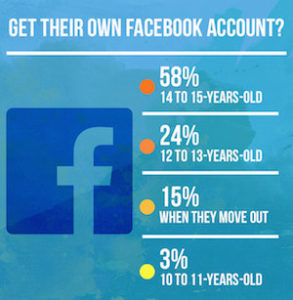
Social Media: While most parents would not allow their children to open social media accounts, one third said that middle school was a good time to allow it. As a clinician who has worked with teen girls I can tell you that the middle school girls I saw not only were unable to self-regulate the amount of time they spent on their device, they also dealt with more issues of cyber-bullying and struggled with the skills on handling online misconduct. Many of them disclosed to me in confidence their online mishaps, conversations, and bullying…all of which parents are completely unaware. Middle schoolers are just beginning to be aware of other people around them and cannot conceive the cruelty that humans are capable of, much less handle it on their own. For some of them, thoughts of ending their life held the answer when they could not figure out another way.
I recommend teens in high school utilizing beginning accounts like Instagram, Facebook, and Twitter, while being consistently monitored (not dissected) by parents. Not for the sake of voyeurism, but to look for talking points on handling online misconduct and affirming self-regulation (the self control needed to movein and out of the digital world into reality). If you allow your middle schooler social media, make sure you are aware of who they are talking to and friending at all times.
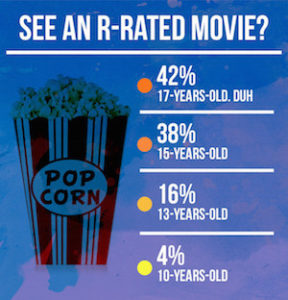 Adult Content: This one really surprised me. On one hand, parents were almost unanimous on the idea of their child/teen getting a permanent tattoo. In fact, the number one answer was “LOL” or Laugh Out Loud. It was a humorous idea to parents that they would consider allowing their teens to make such a life changing decision. Yet, when it came to exposing their children to adult content and violence often found in rated “R” movies, 38% were fine to allow their 15 year old, 16% a 13 year old, and 4% actually would allow a 10 year old. Considering the film industry is allowing more graphic scenes in movies than ever, I’m not sure these parents are tracking the effects of images, violence, and almost pornographic material being introduced so young. I was shocked at the previews before the recent Avengers movie I took my boys to (ages 8 and 11yrs). It was rated PG-13 and I had researched it beforehand only finding a few cuss words to give it such rating. An “R” movie is even worse. It has long been known that these images produce not only a curiosity for more but introduce them to concepts about sex, relationships, and violence before the parent’s (hopefully heathy) teaching has had a chance to take root.
Adult Content: This one really surprised me. On one hand, parents were almost unanimous on the idea of their child/teen getting a permanent tattoo. In fact, the number one answer was “LOL” or Laugh Out Loud. It was a humorous idea to parents that they would consider allowing their teens to make such a life changing decision. Yet, when it came to exposing their children to adult content and violence often found in rated “R” movies, 38% were fine to allow their 15 year old, 16% a 13 year old, and 4% actually would allow a 10 year old. Considering the film industry is allowing more graphic scenes in movies than ever, I’m not sure these parents are tracking the effects of images, violence, and almost pornographic material being introduced so young. I was shocked at the previews before the recent Avengers movie I took my boys to (ages 8 and 11yrs). It was rated PG-13 and I had researched it beforehand only finding a few cuss words to give it such rating. An “R” movie is even worse. It has long been known that these images produce not only a curiosity for more but introduce them to concepts about sex, relationships, and violence before the parent’s (hopefully heathy) teaching has had a chance to take root.
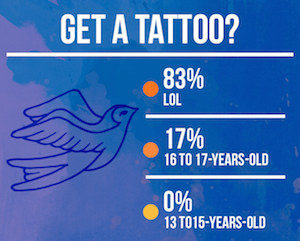 Compare this to the poll that address when to have the “sex talk”. With 58% willing to let children under 15 years watch an R movie, 29% are waiting till the “teen years” (implying 9th grade and up) to talk about sex, and 7 % aren’t even willing to talk about it. So let me get this right, more than half of parents don’t mind letting Hollywood educate their children for them, one third will wait until too late to talk about it, and some consider it not their responsibility at all. Follow this with when they think a child should be able to date- a time when they should definitely know what sex is, what it is for, and how they should be treated in a relationship.
Compare this to the poll that address when to have the “sex talk”. With 58% willing to let children under 15 years watch an R movie, 29% are waiting till the “teen years” (implying 9th grade and up) to talk about sex, and 7 % aren’t even willing to talk about it. So let me get this right, more than half of parents don’t mind letting Hollywood educate their children for them, one third will wait until too late to talk about it, and some consider it not their responsibility at all. Follow this with when they think a child should be able to date- a time when they should definitely know what sex is, what it is for, and how they should be treated in a relationship.
Again, I was pleased with the majority vote of 57% waiting until a teen is 16yrs which I will address in a moment. But again, 33% said 14yrs old and 4% actually said 12yrs. From my time with tween and teen girls. I can say that this almost 40% is in for a painful familial breakdown once they open pandora’s box of dating younger than 16yrs. I heard a speaker once state that a freshman teen girl will date anything that walks. The teens and I laughed when we heard it, but honestly, I saw it to be incredibly true and most of the teens agreed with it in their therapy sessions alone with me. I dealt with more issues of mistreatment, cyber-bullying, sexting, inability to be alone, and negative affects on self-esteem with girls under the age of 16yrs who had been allowed to date. Freshmen in high school or middle school were often targeted by older boys who could not find someone to date their own age, and of course what girl wouldn’t want an older boy wanting to date them? Thus dating anything that walked. They seemed to have an inability to screen for the “good” boys and more quickly attached their self worth to whether they were “datable”.
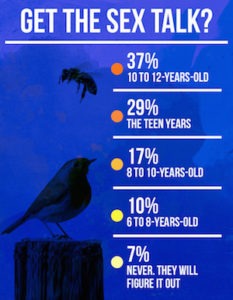
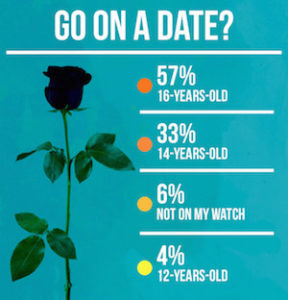 In summary, America- you are doing it wrong. Most of you are headed in a good direction, but the rest of you are playing with fire. Do not overestimate your child’s ability to handle adult situations or know what to do with them when they are exposed to it. Consider waiting until your child proves their ability to balance the digital world with the real world- but that means you must model it first. Liking the opposite sex and wanting to date them will be inevitable, they will even try to sneak it online, but your involvement and teaching will be what they look back on and appreciate. While I am not advocating a suffocating approach that over-restricts the growing independence of a teen, I do recommend a gradual “letting go”, a gentle hand off that guarantees a teens ability to handle the world.
In summary, America- you are doing it wrong. Most of you are headed in a good direction, but the rest of you are playing with fire. Do not overestimate your child’s ability to handle adult situations or know what to do with them when they are exposed to it. Consider waiting until your child proves their ability to balance the digital world with the real world- but that means you must model it first. Liking the opposite sex and wanting to date them will be inevitable, they will even try to sneak it online, but your involvement and teaching will be what they look back on and appreciate. While I am not advocating a suffocating approach that over-restricts the growing independence of a teen, I do recommend a gradual “letting go”, a gentle hand off that guarantees a teens ability to handle the world.
Talk with your children about sex. In a poll I did with teens (which is consistent with other larger polls), children are exposed to their first form of pornography (online or in print) between the ages of 8-11yrs. It is your responsibility to educate your children, not the world. Even worse is expecting them to educate you. If you wait for the culture to do it, you will find yourself and your family out of control before you know it.



